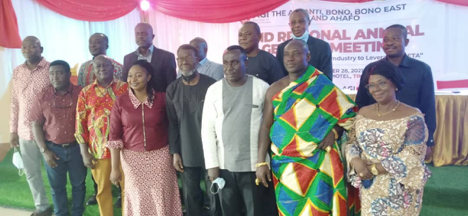Local businesses have been told to consider partnering to strengthen their capacity to compete and exploit the opportunities offered by the African Continental Free Trade Agreement (AfCFTA).
The Chief Executive of the Association of Ghana Industries (AGI), Mr. Seth Twum Akwaboah, noted that while Ghana is developing its industrial base, other countries are far developed and thereby making Ghana a potential target for other participating countries, in AfCFTA.
The risk, he said, is that if local businesses do not position themselves to build their capacity to venture into other markets, they could lose out to others who will be exporting to Ghana, as part of the free trade programme.
Against this background, he said local businesses have a role to play to ensure that the country succeeds, with the implementation of AfCFTA.
He said “we need to prepare and get involved in any way possible,” while charging local businesses to work extra hard to be competitive.
‘This is the time to think of partnerships, mergers, and producing at a larger scale to ensure that the country also enjoys economies of scale and become competitive.’
Mr. Akwaboah said AGI is doing everything possible to offer any help there is to its members to fully participate in the programme.
To this end, he said a system is being put in place to handle member companies to export under AfCFTA.
Meanwhile, he said some member companies have already started exporting under the free trade agreement, making it possible to reach wider and good markets.
Furthermore, Mr. Akwaboah, who was speaking at the 22nd Regional Annual General Meeting, of AGI Ashanti, Bono, Bono East and Ahafo Regions, in Kumasi, entreated small businesses to approach other trading companies (aggregators) to also export to other markets.
The Ashanti Area Director of Ghana Revenue Authority (GRA), Mrs. Agnes Akosua Adu Boateng, also noted that AfCFTA will enable African businesses to add value to their products to ensure the supply of better end-user-product.
This, she added, will lead to an increase in wealth and overall development of the African continent.
Again, she said the continental free trade programme will attract more foreign direct investment since the production of goods and services in one African Country could be sent to another African country without any hindrance.
This, however, she said could lead to the over-concentration of economic activities in a few African countries with low production costs.
“Being a free trade agreement, the fear of many for a reduction in revenue mobilization for the development of our countries cannot be overemphasized,” she stated.
This is because AfCFTA will lead to the elimination of tariffs. “International taxes as a source of government revenue shall experience a heavy decline. As a country, we shall experience a significant reduction of customs duties which forms a greater percentage of our tax revenues.”
Despite this, said the expected industrialization will shore up our domestic taxes, therefore, called for collaboration while ensuring the success of the programme.
Mrs. Adu Boateng added that “as much as we appreciate our teeming businessmen and women to commit themselves to this programme to leverage on all the accompanying benefits of AfCFTA so do GRA entreats all of us to collaborate to help in our drive to achieve our new vision of 17.5% tax to GDP ratio by 2022.”
The 22nd Regional Annual General Meeting, of AGI Ashanti, Bono, Bono East and Ahafo Regions, was held under the theme “Repositioning Local Industries to Leverage AfCFTA.”
The immediate past chairperson of AGI Ashanti, Bono, Bono East and Ahafo Regions, Mrs. Gyamfua Owusu Akyaw, said the AGI remains committed to leading the advocacy for a friendly business environment for local businesses to reap the maximum benefit of AfCFTA.
With the country hosting the AfCFTA Secretariat, she said businesses could only take advantage by repositioning themselves.
She entreated members of the AGI not to relent in their efforts to improve the quality of their products.










